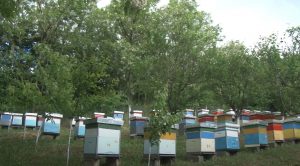This year, beekeeping in Serbia is facing serious problems, primarily due to unfavorable weather conditions and the increasing presence of falsified honey on the market, which has led to a drastic drop in prices. The prolonged drought significantly affected yields, and beekeepers across the country failed to produce enough honey to cover the high production costs. Rodoljub Živadinović, president of the Association of Beekeeping Organizations of Serbia (SPOS), pointed out that many beekeepers are in a difficult situation, so they are forced to sell their hives, while many even leave beekeeping.
Weather conditions were not suitable for beekeeping from the very beginning of the season. The first spring pasture of acacia gave an average yield, while other pastures, such as oilseed rape and meadow grass, were below expectations. The linden honey yield was only 5-6 kilograms per hive, and the sunflower pasture varied depending on the location, often remaining below average. Due to the tropical heat, meadow grazing lasted a short time, which further reduced yields, which barely reached ten kilograms of honey per hive.
Although the bees survived these harsh conditions, beekeepers are facing serious financial problems. In addition to the drought, counterfeit products on the market are a big problem. According to data, as much as 46% of honey entering the European Union is not real honey. This further reduced the demand for honey, including the most sought-after manuka honey. The situation led to a drop in honey prices below 50% of the production price. This lack of demand makes it impossible for beekeepers to make a profit and cover basic costs.

The Ministry is ready to invest in beekeeping, says Ćirković
State Secretary in the Ministry of Agriculture, Bratislav Ćirković, addressed the media. He emphasized that the state provides support to beekeepers through direct payment measures, where 1,000 dinars are paid per hive, as well as through grants for the purchase of equipment. About one billion dinars is allocated annually to support beekeeping. Ćirković also emphasized the importance of increasing the number of beehives in Serbia in recent years. He subsequently stated that honey has positioned itself as an important export product of the country.
At the 7th Beekeeping Fair of the Southeast Balkans, held in Vranje, it was pointed out that such events play a key role in the beekeeping industry. The fair, called “Open Balkans”, gave beekeepers the opportunity to exchange experiences. During the event, they could learn about new trends and technologies in beekeeping, as well as find new opportunities on the domestic and foreign markets. The organizers of the fair are the Association of Beekeeping Organizations of Serbia (SPOS), the City of Vranje and the European Beekeeping Association. The fair was realized with the support of partner organizations from Greece, Republika Srpska and Albania.
Source: boljazemlja.com


